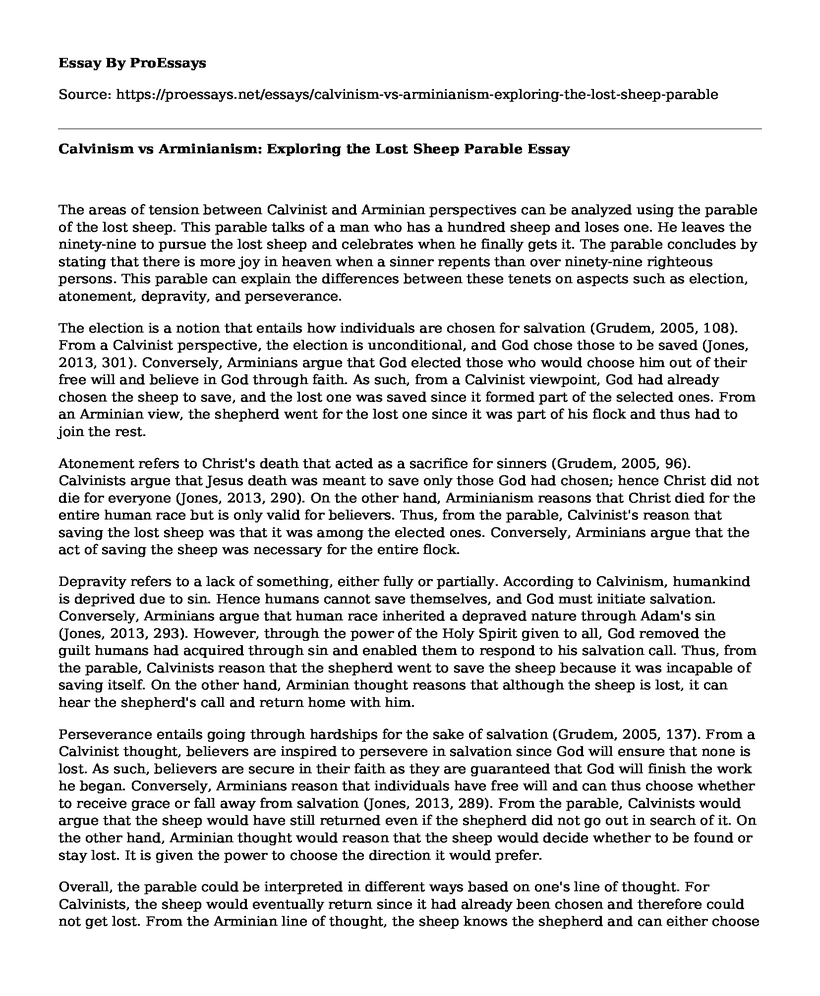The areas of tension between Calvinist and Arminian perspectives can be analyzed using the parable of the lost sheep. This parable talks of a man who has a hundred sheep and loses one. He leaves the ninety-nine to pursue the lost sheep and celebrates when he finally gets it. The parable concludes by stating that there is more joy in heaven when a sinner repents than over ninety-nine righteous persons. This parable can explain the differences between these tenets on aspects such as election, atonement, depravity, and perseverance.
The election is a notion that entails how individuals are chosen for salvation (Grudem, 2005, 108). From a Calvinist perspective, the election is unconditional, and God chose those to be saved (Jones, 2013, 301). Conversely, Arminians argue that God elected those who would choose him out of their free will and believe in God through faith. As such, from a Calvinist viewpoint, God had already chosen the sheep to save, and the lost one was saved since it formed part of the selected ones. From an Arminian view, the shepherd went for the lost one since it was part of his flock and thus had to join the rest.
Atonement refers to Christ's death that acted as a sacrifice for sinners (Grudem, 2005, 96). Calvinists argue that Jesus death was meant to save only those God had chosen; hence Christ did not die for everyone (Jones, 2013, 290). On the other hand, Arminianism reasons that Christ died for the entire human race but is only valid for believers. Thus, from the parable, Calvinist's reason that saving the lost sheep was that it was among the elected ones. Conversely, Arminians argue that the act of saving the sheep was necessary for the entire flock.
Depravity refers to a lack of something, either fully or partially. According to Calvinism, humankind is deprived due to sin. Hence humans cannot save themselves, and God must initiate salvation. Conversely, Arminians argue that human race inherited a depraved nature through Adam's sin (Jones, 2013, 293). However, through the power of the Holy Spirit given to all, God removed the guilt humans had acquired through sin and enabled them to respond to his salvation call. Thus, from the parable, Calvinists reason that the shepherd went to save the sheep because it was incapable of saving itself. On the other hand, Arminian thought reasons that although the sheep is lost, it can hear the shepherd's call and return home with him.
Perseverance entails going through hardships for the sake of salvation (Grudem, 2005, 137). From a Calvinist thought, believers are inspired to persevere in salvation since God will ensure that none is lost. As such, believers are secure in their faith as they are guaranteed that God will finish the work he began. Conversely, Arminians reason that individuals have free will and can thus choose whether to receive grace or fall away from salvation (Jones, 2013, 289). From the parable, Calvinists would argue that the sheep would have still returned even if the shepherd did not go out in search of it. On the other hand, Arminian thought would reason that the sheep would decide whether to be found or stay lost. It is given the power to choose the direction it would prefer.
Overall, the parable could be interpreted in different ways based on one's line of thought. For Calvinists, the sheep would eventually return since it had already been chosen and therefore could not get lost. From the Arminian line of thought, the sheep knows the shepherd and can either choose to return to the flock or stay away. The two tenets have biblical foundations and often leave believers with unclear perspectives.
ReferencesGrudem, W. (2005). Christian beliefs. Grand Rapids: Zondervan.
Jones, T. P. (2013). Rose Bible Basics: Christian History Made Easy. Rose Publishing, Inc.
Cite this page
Calvinism vs Arminianism: Exploring the Lost Sheep Parable. (2023, May 30). Retrieved from https://proessays.net/essays/calvinism-vs-arminianism-exploring-the-lost-sheep-parable
If you are the original author of this essay and no longer wish to have it published on the ProEssays website, please click below to request its removal:
- The Role of Society in Crime Prevention Essay
- Essay Sample on Women's Movement
- Socrates' Defense of Justice - Essay Sample
- Essay on Rising Knife Crime in England and Wales: Analyzing the Stats
- Paper Example on Forced Displacement in Armed Conflict: Understanding the Role of International Humanitarian Law
- Essay on Creating Effective Literacy Stations for Early Childhood Education
- NCAA Rules: Establishing Student-Athlete Eligibility - Report Sample







